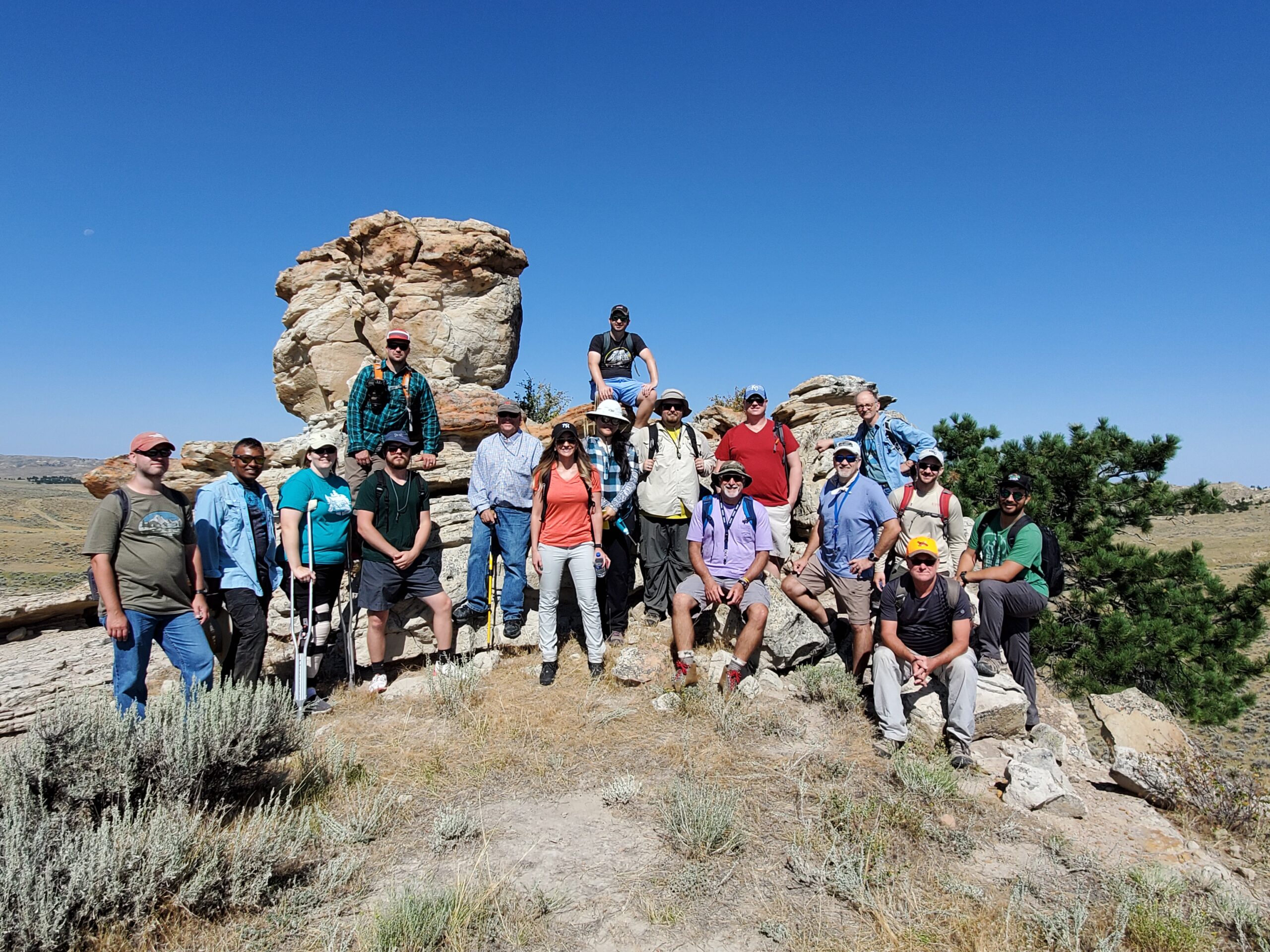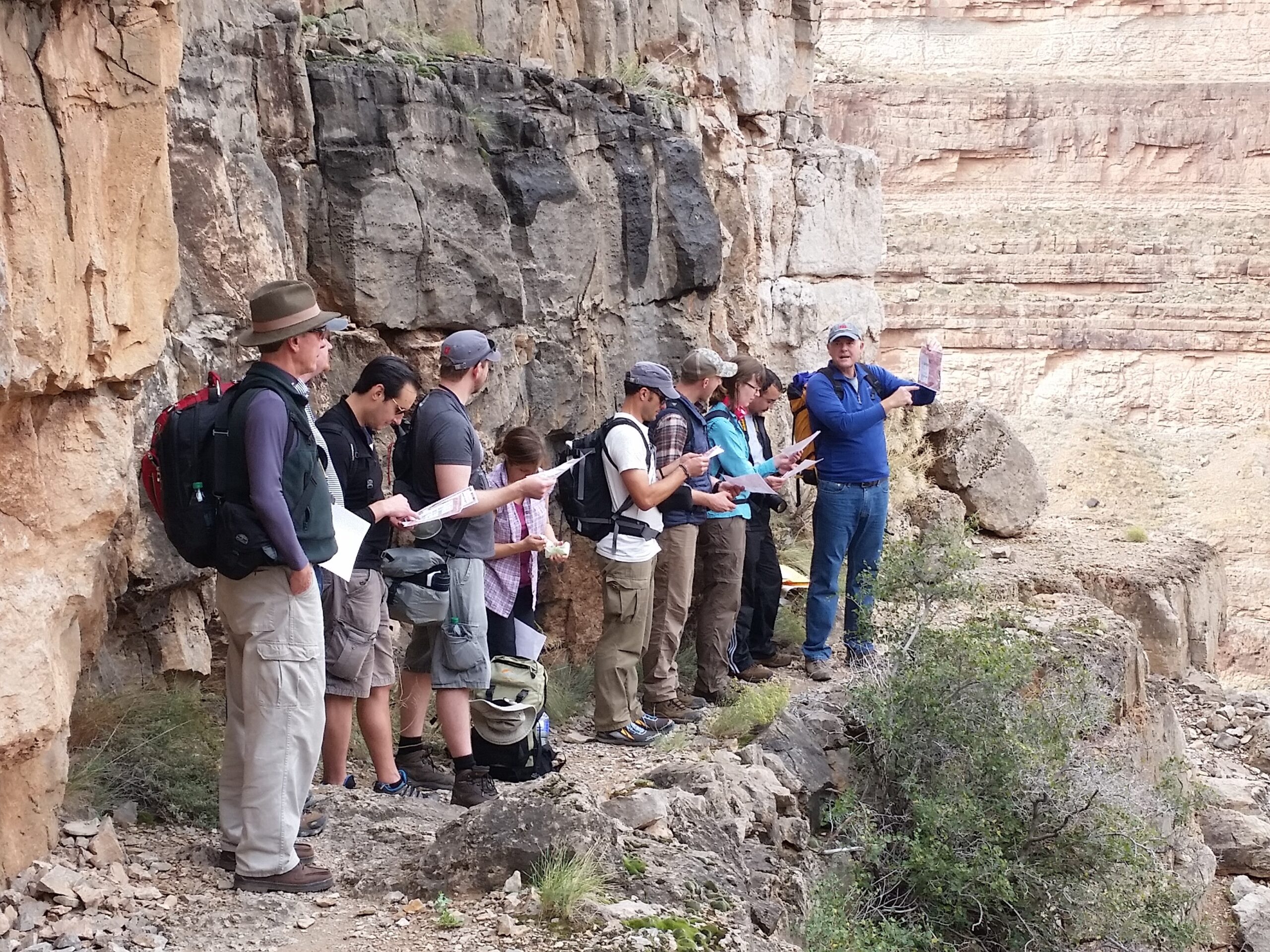TRAININGS, COURSES & CERTIFICATIONS
ASK ABOUT MEMBERSHIP AND COURSES:
ContactEGI@egi.utah.edu | (801) 581 – 5126

Devon Rocky Mountain Field Course
FIELD COURSES
Carbonate Sedimentology & Sequence Stratigraphy Field Course | Petroleum Systems of the Paradox Basin
This four-day field course is designed for geologists, engineers, and others who desire an on-the-ground examination of carbonate sedimentology and sequence stratigraphy. The program will begin at EGI in Salt Lake City with a morning refresher course on sequence stratigraphy and carbonate depositional systems and be followed by a hands-on description and interpretation of core samples from the Middle Paradox Pennsylvanian Formation, from the Paradox Basin at the Utah Geological Survey in Salt Lake City.
From Salt Lake City the course heads south to Green River, UT and proceeds through the Paradox Basin with site discussions at Sinbad Limestone, San Rafael Swell; Upper Hermosa Outcrops, Potash, UT; Hermosa Group at Honaker Trail; production history at Aneth Field; and a float trip (please inquire for the additional fees) through Raplee Anticline including Desert Creek facies and cyclicity and Akah evaporates. The course will conclude with a summation of Paradox Basin stratigraphy and petroleum systems before participants return to airports for departure.
This course will conclude in Bluff, UT. For outbound flights participants may overnight in Moab, UT or return to Salt Lake City on the last day or proceed to airports in Farmington, NM or Grand Junction CO.
Instructor: Affiliate Scientists & EGI Research Staff
Rocky Mountain Depositional Systems (Conventional & Tight) Field Course
This five-day Field Course offers an opportunity to observe and understand the sedimentology and tectonic evolution of several depositional environments in the middle Rocky Mountains of the western United States. It consists of a three-day field course from Denver to Salt Lake City with an additional one-day core workshop at EGI’s Core Repository and half-day lecture at EGI offices in Salt Lake City. The course begins with an overview of Jurassic-Cretaceous mountain building during the Sevier Orogeny on the west, and establishment of a foreland basin toward the east. During the Cretaceous, a clastic wedge of sediments was deposited eastward, ranging from coarse conglomerates near the mountain front grading into sands and shales, and including many prolific sandstone reservoirs known for oil and gas production. Farther east in quieter waters carbonate rocks are found. Interbedded in these sequences are several known source rocks, some of which have now been proven to be reservoir targets for unconventional resource development. On the road, participants will observe distal carbonates and shales to proximal mountain-front clastics. This course is available in either an east to west or west to east direction, depending upon CA interests and needs.
Instructor: Affiliate Scientists & EGI Research Staff
Utah Field Course
This five-day geological excursion through central and southern Utah offers an in-depth, on the ground look at the complex geological history of Utah and the Colorado Plateau from an energy and petroleum perspective. The course progresses from Provo, on Utah’s Wasatch Front, through Moab, Dalton Wells Dinosaur Quarry, Arches National Park, the Paradox Basin, Capital Reef National Park, Bryce National Park, and Covenant Oil Field and includes a one-day raft trip on the San Juan River. Participants may be exposed to varied geological concepts such as reservoir characterization research, landscape evolution, Utah’s oil-producing basins, stratigraphic succession of the Grand Staircase, and geologic history of an oil filed.
Instructor: Affiliate Scientists & EGI Research Staff
Structural Geology Course: Structural Styles and Processes in Petroleum Basins
Structural deformation is associated with petroleum basins on various scales from large-scale basin formation to microfractures in reservoir rocks. Structural geology thus plays a critical role in the evaluation of petroleum system components and processes including hydrocarbon generation, migration, accumulation, and preservation. Structural geology is also used for seismic interpretation and reconstructing the tectonostratigraphic evolution of petroleum basins. This course is offered in two formats: 1-day crash course (8 PDH hours) or 3-day detailed course (24 PDH hours). The course topics include: (1) Structural Deformation: Geometry and Mechanics; (2) Mechanisms of Basin Formation; (3) Tectonic Types of Sedimentary Basins; (4) Extensional Structures and Tectonics; (5) Compressional Structures and Tectonics; (6) Strike-slip Structures and Tectonics; (7) Structural Geology of Petroleum Systems; (8) Salt Tectonics; (9) Shale Tectonics; (10) Structural Geology in Seismic Interpretation.
Instructor: Rasoul Sorkhabi, Ph.D.

Scott Ritter BG Field Course
SHORT COURSES
Evolution of the Petroleum Industry: Progress, Problems and Prospects
This 1-day course attempts to decode the complex history of the petroleum industry; it offers discussions on various dimensions of the petroleum industry from a historical and evolutionary perspective. We will review the birth and growth of the petroleum industry, its interactions with the political and economic history of the modern world, its contributions to science, technology and life standards, and its challenges, problems and prospects.
Instructor: Rasoul Sorkhabi, Ph.D.
Petroleum Geoscience for Engineers
This course is offered in two formats: 1 Day and 3 Days. The one-day “crash” course contains the essentials of the detailed three-day course. Through the evolution of the petroleum industry, various disciplines of geoscience were incorporated into the industry. Meanwhile, geoscience has also rapidly developed in both theoretical and technological aspects. Today, petroleum geoscience is an integral part of the oil and gas industry and plays critical roles in exploration, development and production of oil and gas fields, both conventional and unconventional.
Instructor: Rasoul Sorkhabi, Ph.D.
Petroleum Systems Analysis: An Introduction
The course offers an introduction to Petroleum Systems Analysis (PSA). After discussing source rock deposition in different sediment environments, much attention is given to the process of thermal maturation resulting in the generation and migration of oil and gas. After a review of basic source rock analytical methods, the use of these is exemplified in a few exercises.
Instructor: Ger van Graas, Ph.D.
Exploration Risk and Play Analysis
This course, to be delivered online over two days in 3.5 hour segments, will cover the essentials of exploration risk and play fairway analysis. It will emphasize integration of data and the importance of a solid regional understanding in risking and resource estimation. It will address exploration risk at basin, play and prospect level, and discuss portfolio aggregation and yet-to-find estimation. There will be time for discussion and, if desired, specific company issues and examples.
Instructor: Tony Doré, Ph.D., DSc, OBE
Shale Gas Resource Development
This two-day course provides a concise summary of the varying facets of shale gas development from resource identification and assessment, through production analysis, completion, stimulation technology, and environmental concerns. This course will emphasize describing and understanding the features of shale gas reservoirs that distinguish them from conventional gas reservoirs. This multi-disciplinary approach requires participants to think beyond their own specialties and apply lessons learned from conventional resource development while recognizing the need to develop new paradigms where needed. The course is presented as 1 ½-day theory with a half-day of discussion and further development.
Instructors: John McLennan, PhD.
Introduction to Geomechanics in Low Mobility Plays
This four-day course covers historical background and impact of stimulation decisions, along with Key Formation Properties of Low Mobility Plays, including storage, permeability, and stimulation requirements; Geomechanical Properties including stress, strain, strength, deformation properties, laboratory measurements, logging analyses, and field interpretation; and an Introduction to Hydraulic Fracturing & Implications for Low Mobility Situations with attention to principles for single, planar fractures, multiple interacting fractures, fluid requirements (volumes, sensitivity, etc.), geologic considerations, natural fractures, stress contrast, post-peak behavior, and lithologic considerations. The course also examines near-wellbore considerations for completing these types of wells. Additional issues to be addressed include wellbore integrity, reduced volumes, nonaqueous fluids, and air quality.
Instructor: John McLennan, Ph.D.
Introduction to Petroleum Exploration & Production
This full-day course with an optional half-day workshop or evening activity is an introduction to key phases of the Oilfield Life Cycle, suitable for newly hired scientists and engineers, finance professionals, managers with backgrounds outside the petroleum industry, and support staff including geo-techs, engineering techs, data managers, and administrative support. Based on the model for the Oilfield Life Cycle, the course covers reconnaissance, prospect generation, discovery, reservoir delineation, facilities, primary production, enhanced recovery, and the acquire/divest phases. The optional half-day session includes hands-on simulation.
Instructor: Rasoul Sorkhabi, Ph.D. & Tony Doré, Ph.D., DSc, OBE
Petroleum Geomechanics: Fundamentals and Applications
As the industry moves from the era of easy oil/gas to challenging oil/gas, especially at the time of petroleum recession, lowering the operational cost, improving production, increasing the return of investment, and continued adherence to safety are becoming far more important than any time before. Thus a geomechanics specialist or engineer with a knowledge of geomechanics can play a significant role in improving field operations. However, petroleum geomechanics as an interdisciplinary course encompasses the fields of structural geology, logging interpretation, pore pressure prediction, rock-fluid interaction, rock mechanics, fracture mechanics, etc. Efficient integration of geomechanical fundamentals, laboratory testing and field observations, and proper interpretation and implementation of the results in the field are vital to assure positive outcomes. Therefore, we have tailored an in-house petroleum geomechanics course, and attempt to strike a balance between the theoretical and practical parts, and aim to maximize the practitioners’ benefits by properly implementing geomechanics techniques in daily operations.
Instructor: John McLennan, Ph.D.
Introduction to Reservoir Simulation Theory & Application
Conventional analytical and semi-analytical methods used to describe, evaluate, and predict the production behavior of simple wells give us great insight into the physics of hydrocarbon production. However, as we move towards heterogeneous and highly complex systems such as horizontal wells in shales, naturally fractured formations, multilayered target zones, multiwell projects, etc., we face increasing challenges in the number of analytical tools available to us. Production decisions become even more critical during industry downturns, creating enormous pressure on engineers and geologists to correctly evaluate existing and new projects. Reservoir simulation technologies have profoundly changed the game for reservoir engineers by adding a whole new evaluation tool capable of handling almost any problem.
Significant differences in important prediction and evaluation results are observed when simulations are not performed efficiently. In this short course, we introduce clients who are new or familiar to reservoir simulation to important aspects such as the theory and the fundamentals necessary to make educated decisions. Indeed, reservoir simulation is only as good as the available data as well as the analysis and insight that the simulation user brings. Upon completion of the course, participants will add value to their companies by performing adequate and rigurous simulation studies as well as being able to troubleshoot common simulation issues.
Instructor: Palash Panja, PhD. & Milind Deo, Ph.D.
